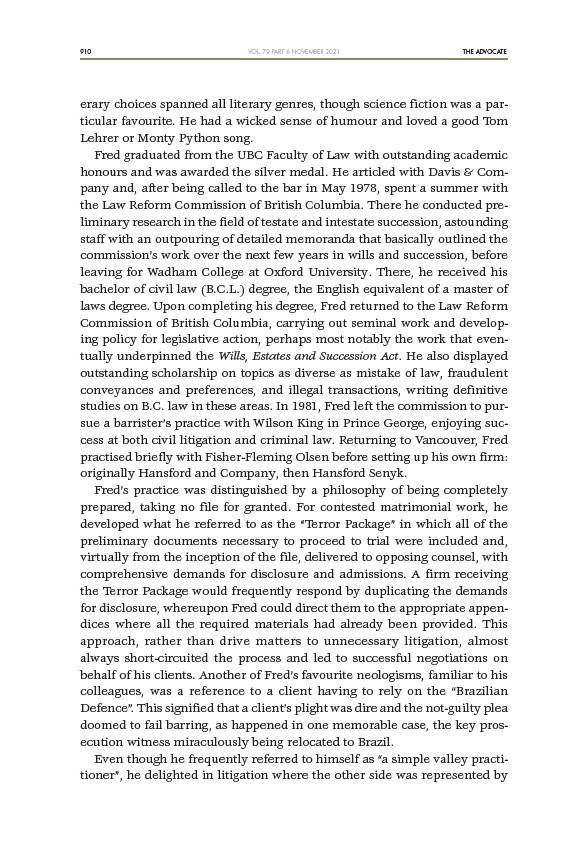
910 THE ADVOCATE
VOL. 79 PART 6 NOVEMBER 2021
erary choices spanned all literary genres, though science fiction was a particular
favourite. He had a wicked sense of humour and loved a good Tom
Lehrer or Monty Python song.
Fred graduated from the UBC Faculty of Law with outstanding academic
honours and was awarded the silver medal. He articled with Davis & Company
and, after being called to the bar in May 1978, spent a summer with
the Law Reform Commission of British Columbia. There he conducted preliminary
research in the field of testate and intestate succession, astounding
staff with an outpouring of detailed memoranda that basically outlined the
commission’s work over the next few years in wills and succession, before
leaving for Wadham College at Oxford University. There, he received his
bachelor of civil law (B.C.L.) degree, the English equivalent of a master of
laws degree. Upon completing his degree, Fred returned to the Law Reform
Commission of British Columbia, carrying out seminal work and developing
policy for legislative action, perhaps most notably the work that eventually
underpinned the Wills, Estates and Succession Act. He also displayed
outstanding scholarship on topics as diverse as mistake of law, fraudulent
conveyances and preferences, and illegal transactions, writing definitive
studies on B.C. law in these areas. In 1981, Fred left the commission to pursue
a barrister’s practice with Wilson King in Prince George, enjoying success
at both civil litigation and criminal law. Returning to Vancouver, Fred
practised briefly with Fisher-Fleming Olsen before setting up his own firm:
originally Hansford and Company, then Hansford Senyk.
Fred’s practice was distinguished by a philosophy of being completely
prepared, taking no file for granted. For contested matrimonial work, he
developed what he referred to as the “Terror Package” in which all of the
preliminary documents necessary to proceed to trial were included and,
virtually from the inception of the file, delivered to opposing counsel, with
comprehensive demands for disclosure and admissions. A firm receiving
the Terror Package would frequently respond by duplicating the demands
for disclosure, whereupon Fred could direct them to the appropriate appendices
where all the required materials had already been provided. This
approach, rather than drive matters to unnecessary litigation, almost
always short-circuited the process and led to successful negotiations on
behalf of his clients. Another of Fred’s favourite neologisms, familiar to his
colleagues, was a reference to a client having to rely on the “Brazilian
Defence”. This signified that a client’s plight was dire and the not-guilty plea
doomed to fail barring, as happened in one memorable case, the key prosecution
witness miraculously being relocated to Brazil.
Even though he frequently referred to himself as “a simple valley practitioner”,
he delighted in litigation where the other side was represented by